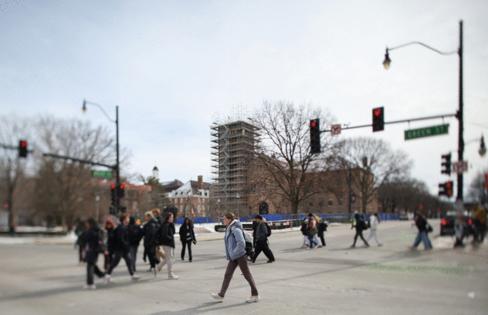Commentary: The health of our society depends on students equipped to embrace uncertainty
Published in Op Eds
The Big 10 is a powerhouse. As fall arrives, our student athletes will be returning to campus, and we will have the pageantry of Saturday afternoon football. But the Big 10 is also the educational engine of our nation.
Our 18 member institutions are spread across the country, from Rutgers, New Jersey, to Seattle and Los Angeles. Each fall, in large cities and Midwest college towns, we welcome more than a half-million undergraduate students to our doors. Our collective library (the Big Collection) holds more than a quarter of all the books in all the libraries of North America. We do higher education at a scope and scale unmatched in this country and the world.
Public support for higher education is essential for the collective health of our future society. To be sure, there are many routes our young people can choose in life, including entering the workforce right out of high school, trade schools and higher education. And while some may say academics exist in an ivory tower, the experience of welcoming generations of young people into our institutions each year provides a constant reminder of what is gained by educating young adults to ask why and why not rather than to rely on rote certainty.
As a professor at the University of Illinois, I wear multiple hats. I teach classes that range in size from 60 to nearly 200 students, run a research laboratory that pursues cutting-edge biomedical research and do the service work that help our universities run.
In the classroom, I help students learn how, not what, to think. We live in an age where literal mountains of information are just … available. The trick is knowing what to do with that information. How to navigate what is known, but most importantly how to deal with what is uncertain.
I also run a tissue engineering research lab. Undergraduate students, graduate students seeking a doctorate, and postdoctoral associates (those who have already received a doctorate) work together in teams to develop new biomedical technologies. It is essential young researchers learn how to identify a problem, develop strategies to address it, build teams and assess how well they meet their goals, and overcome failures along the way.
Instead of learning to pattern match, young researchers must learn how to illuminate new spaces and create entirely new connections. And because we work at the edge of what is known, our studies often take us in directions both surprising and entirely different from how we set off.
This fall not only marks a return to classes but also a deadline. U.S. Health and Human Services Secretary Robert F Kennedy Jr., the person tasked to oversee not only our nation’s health care systems but also our health research infrastructure including the National Institutes of Health, pledged this spring“a massive testing and research effort” that would determine the cause of autism by September.
This statement fundamentally misrepresents how research is done. It offers fast certainty rather than acknowledging and embracing the reality of an unknown horizon. It offers false hope to patients and families. And it mocks the efforts of those who have committed their lives and careers to understanding disease and developing cures.
One of the most important skills I teach young researchers is how to navigate uncertainty. Biology and our bodies are complex. Progress requires understanding what your research does, and often more importantly does not, contribute. Publishing our findings as scientific manuscripts is the currency of academic researchers. Yet a single research project does not, and cannot, solve all things.
So in the discussion section of these manuscripts we identify the new things we have found, describe connections between our findings and the prior work of others, and where we acknowledge what we don’t yet know or what our studies do not allow us to know. The best researchers have the most nuanced discussions that contextualize this uncertainty. This is the truth we offer. Show me a discussion that only offers certainty, and I see a scientist who ether does not understand what they are working on or is too arrogant to admit the things they don’t yet know.
We must all learn to more confidently embrace uncertainty. The world is only getting more complicated and the challenges we face harder. Our young people especially deserve the opportunity to learn how to work on hard problems, to fail, to persist and eventually to make progress.
The health of our society depends on generations of young students equipped to embrace, and succeed in the face of, uncertainty. The Big 10 and our nation’s higher education community provides the tools they need to be able to confront the largest of challenges we all face. To embrace uncertainty and difficult conversations, and come out prepared to co-create a healthier future.
____
Brendan Harley, Sc.D, is a Harvard and Massachusetts Institute of Technology-trained bioengineer and decorated professor at the University of Illinois who works at the intersection of health, society and our imagination.
___
©2025 Chicago Tribune. Visit at chicagotribune.com. Distributed by Tribune Content Agency, LLC.
























































Comments